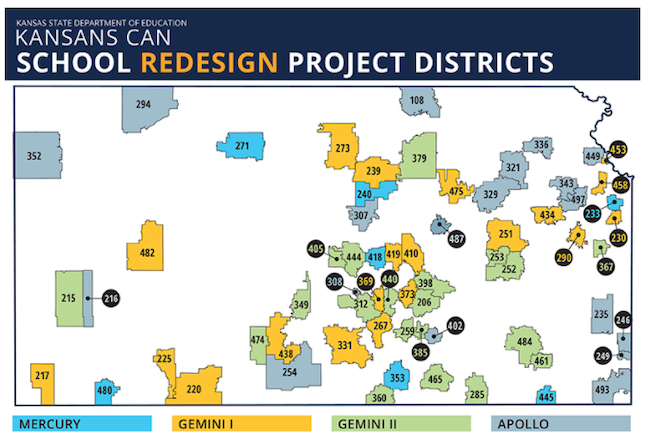Add the “Kansans Can” school redesign project, and its statewide push toward personalized learning and soft skills, to the growing list of educational initiatives disrupted by the coronavirus.
Shortly before the mid-March closure of all Kansas school buildings for the remainder of the year, education officials issued the “Lift Off” progress report on how several pilot districts were revamping their approach to instruction.
“We’ve seen shifts to personalized learning from the rigid factory model of education where all students learn the same concept at same time,” said Jay Scott, a secondary redesign specialist with the Kansas State Department of Education. “We’re going from a teacher- and content-centric system to a student-centric system.”
Students in the first cohort of schools involved in the initiative are being guided by teachers in setting a vision for their education and creating a learning plan to achieve it.
More from DA: District leader says let teachers innovate online during coronavirus closures
Project-based and work-based learning opportunities, along with public service and civic engagement, play big roles in those learning goals because these approaches allow students to apply learning to the real world, Scott said at a news conference when the report was released.
Social-emotional learning is also a key focus. “More resilient and engaged learned does better on all assessments,” added Scott, a former teacher and administrator.
Early indicators of success include increased levels of attendance and a reduction in behavior referrals. Reports from schools also indicate that students are more excited and engaged about learning, Scott said.
“Many of the schools have found out that one of their most underutilized resources is the students themselves,” Scott said. “Schools in the redesign have engaged students deeply in the work and found many of them are coming up with strong ideas about how to redesign and personalize education.”
Parents, business and community members have played a big part in the project by providing input on what skills students need to succeed after high school graduation.

“What we’re really looking at is, are students on the path to success two years after leaving high school,” Kansas Commissioner of Education Randy Watson said at the press conference. “We’re not looking at measurements that just look good on a scorecard. We’re really in this to change the trajectory of kids’ lives.”
More from DA: How 5 districts elevate learning with competency-based education
Districts in the project have not received additional funding or waivers from any state education regulations. Schools did receive professional development and coaching from state redesign specialists.
The progress report includes some early results from schools across the state:
- Dighton Elementary in Dighton, Kansas, saw increased scores on state math and English assessments in fourth- and fifth-grade after adopting project-based, personalized
learning. - Beloit Elementary School in Beloit, Kansas—which focused much of its redesign energy around social-emotional growth—was on track for the lowest number of office referrals in five years.
- Beloit Junior-Senior High School increased by 8% the number of students scoring in the top two levels on state math and English assessments.
- Santa Fe Trail Middle School in Olathe USD 233 saw 100% attendance on five new “Exploration Days” that let students attend interest-based breakout sessions.
- Wellington High School went from about 30% of graduates meeting one of three district-identified college-and-career-ready benchmarks in 2017-2018 to 40% in 2018-2019.
State officials plan to engage all of Kansas’ 286 districts in the redesign by 2026.







